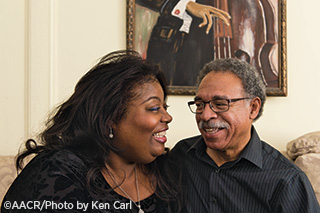March is Kidney Cancer Awareness Month
Join with the AACR to find better ways to prevent and treat kidney cancer

Cancer of the kidney is among the most common cancers in the United States, with approximately 81,610 new diagnoses and 14,390 deaths in 2024, according to federal estimates.
Kidney cancer is also known as renal cell cancer. Renal cell carcinoma is the most common type. Treatment often involves surgery to remove all or part of the affected organ. After surgery, doctors will often use chemotherapy or radiation therapy to destroy cancer cells that remain.
In recent years, the use of molecularly targeted therapeutics and immunotherapeutics have transformed clinical care for patients with kidney cancer. The immunotherapeutic pembrolizumab (Keytruda), for example, was shown to be the first postsurgical immunotherapy to help patients with early-stage kidney cancer live longer, as described in Cancer Today, AACR’s magazine for cancer patients and their loved ones.
An advanced form of radiotherapy called stereotactic body radiotherapy (SBRT) can be effective in treating kidney tumors when surgery is not an option, as discussed in the AACR Cancer Progress Report 2024. This is because SBRT allows the precise delivery of higher doses of radiation while minimizing damage to nearby healthy tissues.
Smoking is a risk factor for kidney cancer. So is misuse of certain pain medicines, including over-the-counter drugs. In addition, certain genetic conditions, such as von Hippel-Lindau disease, increase a person’s risk of developing kidney cancer.
more on kidney cancer research
- New options being studied for treating kidney cancer are highlighted in Cancer Research Catalyst, the official blog of the AACR.
- The AACR held its first Special Conference on Advances in Kidney Cancer Research in Austin, Texas, in 2023. Cancer Research Catalyst carried a preview of the meeting: Q&A With M. Celeste Simon, PhD, FAACR, on Advances in Kidney Cancer Research. Brief summaries of the scientific presentations are available online.
- The next AACR Special Conference on Kidney Cancer Research will be held March 13-16, 2026, in Philadelphia.
One Person’s Story

Billy Foster, a jazz musician and retired music teacher in Gary, Indiana, has been living with kidney cancer since 1996. He had surgery as his first treatment. After the cancer came back years later, he has had several new therapies and now has stable disease. Read his story here: Billy Foster: Focused on the Healing Power of Music
What the AACR is Doing in The Area of Kidney Cancer Research
With its funding partners, the AACR supports promising research in kidney cancer, including these grants:
- AACR-Exelixis Renal Cell Carcinoma Research Fellowship, awarded to Cary N. Weiss, MD, PhD, Dana-Farber Cancer Institute in Boston. He is studying translocation renal cell carcinoma (tRCC), a rare, aggressive kidney cancer with higher incidence in children, young patients, women, and as a secondary malignancy.
- AACR-KidneyCAN Kidney Cancer Innovation and Discovery Grant, awarded to Qing Zhang, PhD, University of Texas Southwestern Medical Center in Dallas, for his research that aims to reverse drug resistance in clear cell renal carcinoma.
- AACR-KidneyCAN Kidney Cancer Innovation and Discovery Grant, awarded to Edus H. Warren, MD, PhD, Fred Hutchinson Cancer Center in Seattle, to support his work to improve the immune checkpoint inhibitor response rate for clear cell renal cell carcinoma.
W. Kimryn Rathmell, MD, PhD, former director of the National Cancer Institute, is a renowned kidney or renal cell cancer researcher. During her career in academic medicine, she received support from the AACR and funding partners. She discussed how grant-funding partnerships provide critical support for cancer researchers.
for more information
Please see our page on Kidney Cancer, which includes detailed information on treatment.

